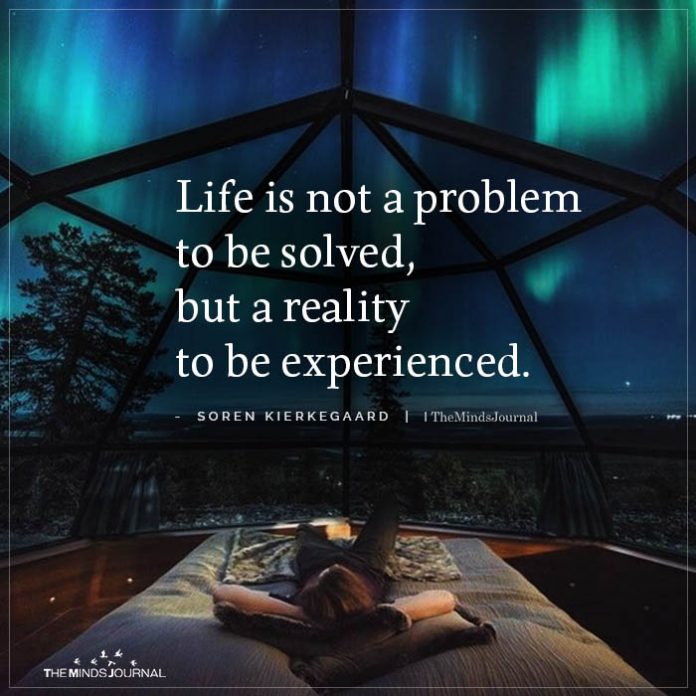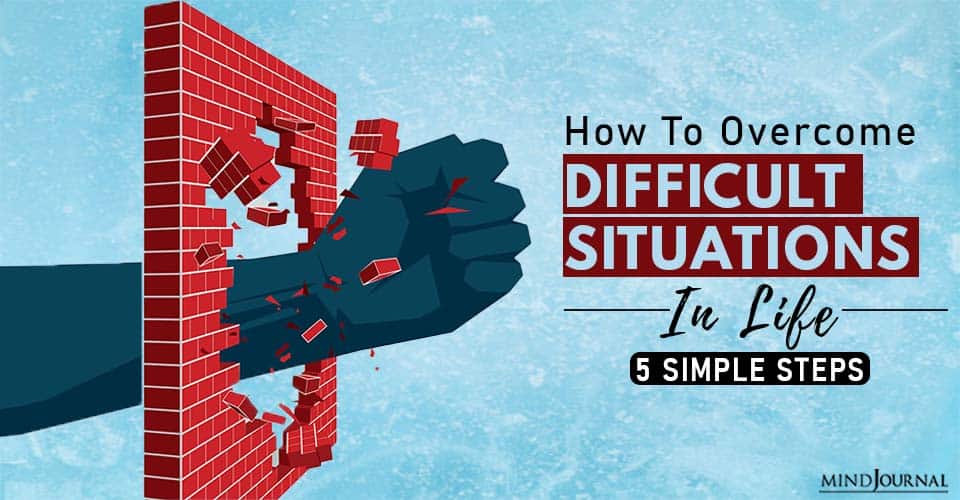Overcoming difficult situations in life is challenging for most of us. However, how we respond to hard times can help us alter the course of our lives and turn difficulties into happiness.
Life is unpredictable, to say the least. One moment everything is going fine, and then suddenly something happens and your entire life flips upside down. When you realize and accept that life is not fair, you can become a lot more resilient and find ways to get through difficult situations in life.
Psychotherapist and author Amy Morin write “No one ever promised that life would be fair. In fact, life is unfair often. Your ability to accept that life isn’t meant to be fair can go a long way when it comes to getting you through tough situations in life.”
Learning healthy and strategic ways to deal with adversity can help us develop skills to cope effectively and recover better.
Read Why Strong People Face The Most Difficulties In Life
Ways To Cope With Difficult Situations
Regardless of how hard and overbearing a situation is, there is always hope. There is always the possibility that you can get through it and stand tall. Of course, it’s easier said than done. But if you are willing to put in the effort, you can overcome even the most difficult situations. Here are 5 steps that can help you get started in the right direction.
1. Focus on the solution, not the problem
Nothing in life is permanent. Just like good times in life, hard times are also temporary and are bound to pass. No problem or challenge, irrespective of how big it may be, will ever last forever. All the difficult emotions you are experiencing right now, all the struggles and failures, all the heartbreaks, frustrations, anxiety, and depression, it will all pass, regardless of how intense they may be right now. You will get out of this dark abyss to feel the warm sunlight once again.
However, you will need to stop holding on to your pain and start looking at how you can climb out of this dark pit you’re stuck in right now.
Instead of being problem-focused, develop a solution-focused mindset. Instead of being attached to your problems, invest your time and energy in looking for probable solutions and developing strategies to cope with them. Accept and acknowledge the problems and the pain you are experiencing right now and tell yourself that this will pass eventually.
“Sometimes awful things occur because they are a necessary part of life, but these events – like so many others before them – are transitory and always, inevitably, serve as springboards to the next revelation, the next renewal, or the next chapter. This, too, shall pass,” writes marriage & family therapist Dr. Howard C. Samuels Psy.D.
Read 6 Ways To Control Your Unwanted Emotions In Any Situation

2. You are a survivor. You have survived this before.
You have been through countless difficult situations before in your life and have overcome them time and again. You have all the strength you need to survive and win this time as well. Yes, the game is different this time around and it may be your biggest challenge yet. “But you have a 100% success rate at overcoming difficult situations,” explains author Margie Warrell.
The problem is, we often tend to underestimate our resiliency. You always have the strength you need to win over life. You simply need to discover it at times. And this is what struggles are all about. “In assessing your situation, you also need to assess your life and look at what you’ve already survived and known that whatever you are going through cannot hold a candle to your indomitable spirit,” adds Dr. Samuels.
Sometimes, we are unable to realize how much mental and emotional strength we truly have inside unless we fall down. As we haven’t felt the need to use this strength yet, we are often oblivious of the strength we carry. However, obstacles and challenges provide us the opportunity to harness that inner strength. Allow your willpower to take charge and deliberately control your thoughts and tap into that strength, even if it might be painful for the time being.
Dr. Samuels writes “You are courageous enough to change what you think is your destiny. You are worthy of a better life than the one you have now. The lie, sometimes, is in believing it is going to happen overnight. Sometimes, you merely have to accept the fact that you’re going to have to take tiny, baby steps to reach your goal.”
3. Decide what to do for yourself
Never allow other people to control or influence your reality. Life is full of ups and downs. Difficult situations and happy moments create a subtle balance that enables us to learn valuable lessons, discover our strengths and realize what true happiness is.
However, when you allow other people to dictate your thoughts and emotions, you rob yourself of the painful experiences that life has given you as an opportunity to grow. Your struggles, failures, and pain are your own. You should not face them the way someone else defines them to you. You need to create your own reality. Only then you will be able to learn what life is teaching you.
Read 3 Ways to Help You Make Difficult Decisions
It is highly crucial now that you have faith in yourself. That you believe that you can get through this on your own. Margie Warrell writes “Trusting yourself may not change your experiences in life, but it can change your experience of life. The more you trust that ‘you’ve got this,’ the sooner you actually will.” No one will understand your pain or your grief.
They have not lost what you have lost. Your pain is yours alone. So you should not allow anyone else to decide what you should think and feel.
“Life goes on, sure, but it is my life, and I am allowed to experience grief in whatever way it manifests itself as long as I understand that there are also things I can do – actions I can take – to ensure that I am not crippled by sadness and loss,” writes Dr. Samuels.
4. Identify what you can change, then change it
When you have a solution-focused mindset, you are better able to analyze the situation and recognize what aspects of the difficult situation are within your control. Once you know that, you can decide to change what you can. Instead of wallowing in self-pity or letting negative emotions take control of you, identify what steps you can take in this situation, develop a strategy and then take action.
Read 5 Powerful Ways To Develop Emotional Stability
“If you can’t change the situation, you may be able to change your attitude,” explains author and psychotherapist Amy Morin. If you are trying to cope with the loss of a loved one, then you need to focus on coping with your intense grief. And one of the ways to do that is to change your perspective. We cannot bring back those who are gone, but we can keep them in our memories and appreciate those who are still with us.
Amy adds “Although it’s unlikely you can suddenly change your attitude overnight, you can change it over time. It is a process that takes hard work.” Changing your attitude can prove to be highly beneficial in bringing about a big change.
It is also important to recognize what you can’t change and accept the difficult situation as it is. “Don’t waste time and energy trying to change things you can’t change. Spending too much time thinking about and wishing things were different won’t do any good,” writes Amy.
5. Understand the life lesson
Whether you like it or not, everything happens for a reason. Everything has a purpose and a meaning. Sometimes it’s obvious, while at other times we need to discover it by struggling through difficult situations. Amy adds “Usually something good can come out of even the worst situations. Focus on what you might gain for having survived a tough situation. Whatever it is, try to view the situation as a learning experience that will help you in some way later in life.”
Read How To Be In Charge Of Who You Are Becoming
Have faith that there is a lesson in your struggles and negative experiences. Something that will guide you towards a better life. A better version of you. Lori Deschene, author and founder of Tiny Buddha, writes “Focusing on the lesson allows you to work on positive change, which will make you feel empowered instead of deflated.”
See the situation for what it is. Accept it and acknowledge it wholeheartedly. Don’t try too hard to understand, overanalyze or even manipulate your experience. “Simply let it offer you something that you can take advantage of so that you can learn and become stronger,” explains Exploring your Mind.

Life is tough. But so are you.
Life is uncertain and unpredictable. It often throws us into difficult situations that we think will break us. But, in reality, it challenges us to discover the strength hidden inside and empowers us beyond our imagination in the process.
Life happens for each and every one of us. Whether we choose to crumble down or fight is up to us. But when you decide to face your fears, you emerge as a different person on the other side. Lori Deschene concludes “You can’t always get what you want, but you can work at being who you want to be no matter what life throws at you.”
Read 7 Ways You Can Make It Through Difficult Life Transitions And Thrive
Here is an interesting video that you may find helpful:











Leave a Reply